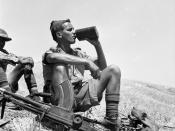What if? Counter-factual history is very crucial to our understanding of the nature of history. It shows us how even the smallest event in the past has shaped our world today. Much of our history has been formed from chance and luck. What counter-factual history does is explores the alternative routes that an event could have yielded had it turn out differently. It teaches us what type of outcome could have occurred and opens our minds to the vastness of history's paths. It shows us that history does not ride a clear-cut path, but rather makes twists and turns--some of which can be predicted, and others that are pure luck. Whatever road history chooses, we should always remember that our decisions today might affect us tomorrow.
Henry Agard Wallace was born on October 7, 1888 on a farm in Iowa. After graduating from Iowa State College, he took over the family paper Wallace's Farmer upon the death of his father.
In 1933, Franklin D. Roosevelt appointed Wallace to secretary of agriculture. Wallace carried out the "New Deal" policy by providing assistance to farmers. In 1940, despite Wallace's unpopularity among the Democratic House, Roosevelt choose Wallace for his vice-president running mate. The leaders of the Democratic party found Wallace too much alike to Roosevelt to balance out the ticket; they said that Wallace would not make a good politician. When it looked like Wallace would not receive the nomination, Roosevelt threatened to back out of the race because he believed that he could not run for a party that was not equal in its support for "social progress and liberalism." Henry Agard Wallace became Vice President on January 20, 1941.
Wallace stayed loyal to Roosevelt's "progressive vision for a better world," so he looked like Roosevelt's obvious successor. Despite this fact,


